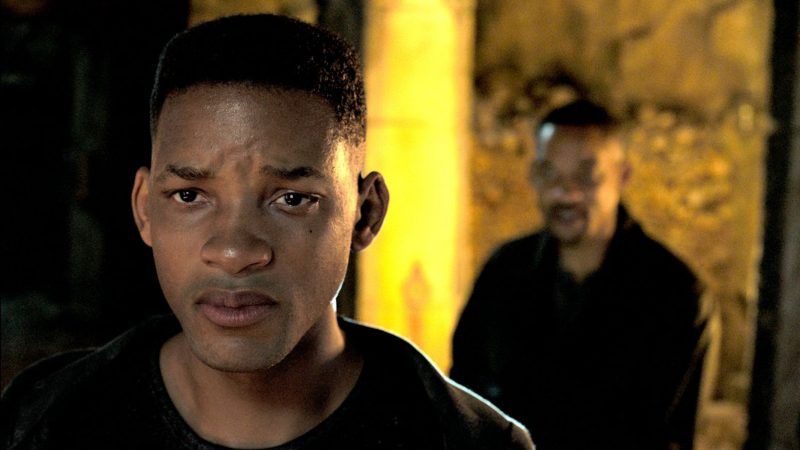Gemini Man Is an Extended Visit to the Uncanny Valley
Will Smith fights his younger clone in this ambitious but underwhelming action thriller.

Looked at one way, Gemini Man is a classic tale of man versus himself: The Bourne-esque sci-fi thriller pits a middle-aged Will Smith against a younger, computer-generated clone, constructed partly from images of Smith as a 20-something movie and TV star. Smith's technology-enhanced dual role anchors the movie, and gives it a reason for being. The idea for the film reportedly languished in development for decades, and was only made once Smith signed on. Where there's a Will, there's a way.
As a big-budget tech demo, Gemini Man is ambitious and fascinating: Finally! A way to appease all those viewers who've been clamoring for cinematic technology that lets the Fresh Prince of Bel-Air face off against Genie from Aladdin. As a movie, it's flat stilted, an extended visit to the uncanny valley.
Hollywood has always cast aging stars opposite fresh-faced talent, but in this case, the face is literally Smith's own. In an industry that has always treated any perceptible sign of aging as a mortal threat to one's career, there is arguably something courageous about submitting to such a concept, which offers a visceral reminder of the toll of time. Here, the movie seems to say, is the competition: Will Smith used to be young, and beautiful, and…look oddly like a character out of a video game. I can't wait to play him when he inevitably becomes an avatar in Overwatch.
Which is why the better way to view Gemini Man may not be as a story of man versus himself, but of humans versus technology. Spoiler alert: Nobody wins.
Junior, the name given to the movie's younger Smith, was not conventionally de-aged like Samuel L. Jackson in Captain Marvel, a process more like applying digital make-up, so much as virtually replicated. Junior is better understood as a full-body digital costume wrapped around a motion-capture performance, then tweaked and tailored by an army of digital artists. Smith plays a younger version of himself by donning what is effectively a Young Will Smith mask and suit.
Smith's on-screen opponent is thus a sort of digital clone, a virtual person constructed using a cinematic process that mirrors the biological cloning portrayed in the film. But while technically impressive in some ways, Junior still tends to come across as less than fully real. There's a slightly unnatural quality to the character's brow and eyes, to the way his lips don't quite seem to be in sync with his words; he's more pixel than person, an animated presence rather than a flesh-and-blood actor. No, the younger Smith isn't Genie-blue, but there were times when I half expected him to shout a jokey catchphrase and disappear into a cloud of cerulean smoke.
Some of the disjointedness can be attributed to director Ang Lee's decision to shoot the film using an ultra-high frame rate, in which a digital camera collects vastly more images per second than the 24-images-per-second that has been standard since the days of film. Less advanced versions of this process have been employed before, on Peter Jackson's first Hobbit film, and on Lee's last movie, Billy Lynn's Long Halftime Walk, but Lee's preferred projection method is so advanced that not one theater in the United States will be able to show it exactly as he intended. Directors who shoot in high frame rates sometimes cast it as a system for creating cinematic hyper-reality, but the results so far are always distracting and weird, like watching a television with motion smoothing turned up to the max. Here, the entire movie exudes a sense of plastic falseness; too many of the images feel synthetic, stilted, or simply off in some difficult-to-precisely-identify way.
The story, meanwhile, is a pastiche of globe-trotting thriller cliches—a private corporation run by a villainous Clive Owen wants to make ultra-reliable super-soldiers because blah blah who cares reasons—that appears to have been written by feeding every Jason Bourne movie script and novel into an AI screenwriting-bot and filming whatever came out. At best it's an ironic metaphor for Hollywood's own desire to endlessly clone its star properties, forcing them into soulless service. But the clunker-packed screenplay never rises above the expository, state-the-theme dullness of lines "I need to get you to Budapest" and "Deep down it's like my soul has been hurt." (Which, same.)
Officially, the writing is credited to Shattered Glass writer Billy Ray, Game of Thrones showrunner David Benioff, and Shrek Forever's Daren Lemke. Yet as with Smith's computer-generated quasi-performance, it's sometimes hard to believe any real person, much less three of them, was involved.
That's a problem for the entire film, which generally comes across as grim, lifeless, and technologically overdetermined. What both Smith's digitized younger self and the movie are missing is a distinctive personality, a sense that there's something human behind the scenes. There's no soul, nor even the winning screen persona of Smith at his best. Gemini Man delivers a digitized double dose of its leading man, but it can't replicate his essential charm. The movie's real problem, you might say, is a lack of Will.
Show Comments (9)